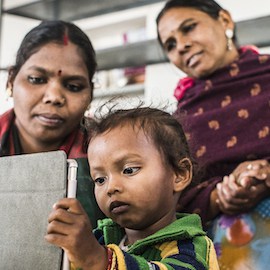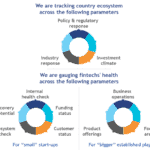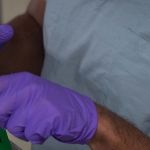Learning From Emerging Markets Entrepreneurs During COVID-19: What Lockdowns Teach Us About Resilience
Grace Necker Endnog has lived in a remote section of northern Kenya all her adult life. In recent years, her primary source of income was the sale of livestock. Then the government closed all the livestock markets to combat the COVID-19 pandemic. Across the border in Uganda, Lamwaka Lillian faced a similar challenge. Typically, she sold tomatoes in a crowded marketplace, but now she fears contracting the coronavirus in the market and bringing it home to her daughter. Due to the pandemic, she decided to close her business instead.
With both of their livelihoods coming to a sudden halt and their children growing hungry, Endnog and Lilian responded the exact same way that resilient entrepreneurs across the globe have pivoted — both women began seeking new opportunities in this ever-evolving new reality.
With strong curfews in place and many shops closed, Endnog noticed that her neighbors could not get the cooked foods they were used to buying. She started making mandazi donuts for them, a small, inexpensive treat that brought her customers happiness during perilous times. She also began selling them sugar and other household staples.
Meanwhile, Lillian knew that handwashing had become an important way to stop the transmission of the coronavirus, so she turned to making soap. She mixes chemicals, scents and coloring to produce a liquid soap that she sells to neighbors and grocery stores.
Building Resilient Entrepreneurs in Emerging Markets
In a time when measures implemented to keep us safe have shuttered businesses all over the world, Endnog and Lillian have a lot to teach the world about the power of resilience, a skill that is becoming increasingly relevant for all of us.
How can entrepreneurs in emerging markets build their resilience? What tools enable them to adapt when everything around them has changed? The answers to these questions should inform the ways governments support their citizens during a pandemic. Finding these answers is a big part of the work we do at the BOMA Project and Village Enterprise.
Over the last decade, the BOMA Project has helped over 33,000 women entrepreneurs in Northern Kenya start new businesses and generate income to “graduate” themselves and their families out of poverty. Village Enterprise provides cash transfers as seed capital, along with training and ongoing mentoring for women and men across East Africa living in extreme poverty. Since the organization’s inception, Village Enterprise has started over 48,000 businesses and trained over 185,000 East Africans.
These entrepreneurs are doing more than just running successful businesses. What’s equally impressive is how they have challenged social norms and evolved into informed leaders in largely patriarchal communities.
The COVID-19 pandemic is just one case in point. A May 2020 survey conducted by the BOMA Project that sampled the responses of 645 respondents (74% of whom were female) in Isiolo, Marsabit and Samburu Counties revealed the positive influence these women were having on their families and communities. In the survey, a majority of respondents said they had stayed home more (75%), stopped attending social gatherings (62%), kept a distance of 2 meters away from others (54%), stopped greeting with handshakes (53%), and washed hands or used sanitizer more frequently (47%) compared to the month prior. Most revealingly, in stark contrast to population segments in the West, only 2% of the respondents believed that hydroxychloroquine/antimalarial medication was effective in battling COVID-19.
COVID-19 is not the first extreme shock these women have weathered. In recent years, climate change has caused alternate cycles of drought and floods that have devastated their region. The droughts left 3.4 million people chronically food insecure. Unseasonal rains in 2020 created two swarms of locusts that moved at over 80 miles per hour and ravaged the local grazing lands. Participants working with the BOMA Project and Village Enterprise have weathered these shocks — just as they are navigating the COVID-19 pandemic.
The results from a survey Village Enterprise conducted in May among 1,100 small business owners demonstrated that the countrywide shutdowns of transportation and markets in Kenya and Uganda have severely affected small business owners. Among these respondents, 71% in Uganda and 84% in Kenya reported that their revenues have decreased. But despite these difficulties, they remained optimistic, with 75% in Uganda and 82% in Kenya expressing confidence that their businesses will recover once the pandemic passes. A survey by the BOMA Project also revealed that BOMA’s women entrepreneurs were diversifying, moving from livestock-related enterprises to businesses like chicken rearing, running dukas and beading, which are not as affected by the pandemic.
All of this raises two important questions. What can we learn from these entrepreneurs who have successfully navigated one shock after another? And what programming can the public, private and social sectors put in place to help people build on this resilience?
The path to resilience
The word “resilience” is what the scientist Marvin Minsky referred to as a “suitcase word.” Suitcase words contain a variety of meanings packed into them — think of words like conscience, experience, right and wrong. Entrepreneurs like Endnog and Lillian can help us unpack the components of the term resilience.
Key to the notion of resilience is adaptability. As discussed above, both Endnog and Lillian were able to quickly pivot to new businesses in the aftermath of the economic aftershocks of the COVID-19 pandemic.
Both entrepreneurs had clear goals they were working towards. For instance, Endnog articulated a desire to generate income and save money so that she can continue to send all of her five children to school.
Finally, both Lamwaka and Lillian were part of supportive communities – including savings groups that allowed group members to pool their savings and access loans. Their pivots to new businesses were successful, but even if these businesses had failed, they could have turned to their group members to see them through these difficult times.
Programs aiming to help vulnerable populations adjust to the profound social and economic aftershocks of COVID-19 should take a page from the examples of entrepreneurs like Endnog and Lillian. More specifically, they should focus on bolstering each of the components that constitute resilience: adaptability, goal setting and a sense of community.
Promoting adaptability: In the financial world, investors have long known the importance of diversification. While diversification does not help combat systematic or market risks (such as market shocks, inflation or interest rate fluctuations), it can help address unsystematic risks that are specific to one company or industry. Similarly, programs put in place to help participants affected by COVID-19 should promote diversity of income sources. For example, women enrolled in the poverty graduation programs at the BOMA Project and Village Enterprise are actively encouraged not to put all their eggs in one basket. Each woman entrepreneur has a primary business along with at least two secondary businesses. By diversifying their enterprises, entrepreneurs ensure that their businesses will not be affected the same way by a single market event.
Bolstering goal setting: Market development programs designed in the wake of COVID-19 should address factors like low incomes, inconsistent cash flows and inadequate financial services for the rural poor. While targeted interventions to address each of these components are important, these programs should be designed in such a way that they support a person’s ambitions in the long term.
Encouraging saving is one way to support this long-term planning. A 2015 study by Susan Johnson, “Capacities to aspire and capacities to save: A gendered analysis of motivations for liquidity management,” highlights the importance of taking actions that are oriented towards the future when it comes to building resilience. The act of saving by its very definition involves deferring today’s consumption to the future, and is deeply tied to aspirational goal setting. In short, savings goes hand in hand with resilience, because people who are saving for today are doing so to enable their plans for tomorrow.
Engaging community: The old adage is trite but true: When designing interventions for marginalized communities, it really does take a village. For example, Both the BOMA Project’s Rural Entrepreneurship Access Program and Village Enterprise’s model leverage group-based interventions at the business group and savings group levels. This approach is appropriate and cost-effective in sparsely populated rural regions, as it accounts for the time poverty that ultra-poor women face, and aligns with traditional rural community values of group identity. For instance:
- At a business group level, both BOMA and Village Enterprise’s models leverage groups made of three women running businesses jointly. In these groups we see women loan money to each other as needed.
- At the larger savings group levels (these are groups comprised of multiple business groups), both organizations find business groups making loans to those most in need. What’s more, groups with extra cash are transferring their assets to digital currency – which makes for greater financial and physical security. These savings groups also serve as support groups, fostering social capital that builds resilience.
The result of all this activity is increased cash flow. This cash helps attract more goods to the market, which in turn drives the proverbial virtuous business cycle and generates more income.
COVID-19 has profoundly impacted communities around the world. There’s no single way to design a program to help people impacted by the pandemic. But based on our experience – and the experience of the entrepreneurs we work with – one thing is clear: Any effective solution will need to explicitly boost the resilience of its participants. And if poverty graduation has taught us one thing, it’s that learning from the people your program benefits is the best approach.
Wendy Chamberlin is a Global Program Director at BOMA Project, and Larry Reed is the founder of Soul of Finance, a blog of stories and reflections on how finance can be used as a tool of liberation.
Photo courtesy of Norad.
- Categories
- Coronavirus, Social Enterprise, Transportation



